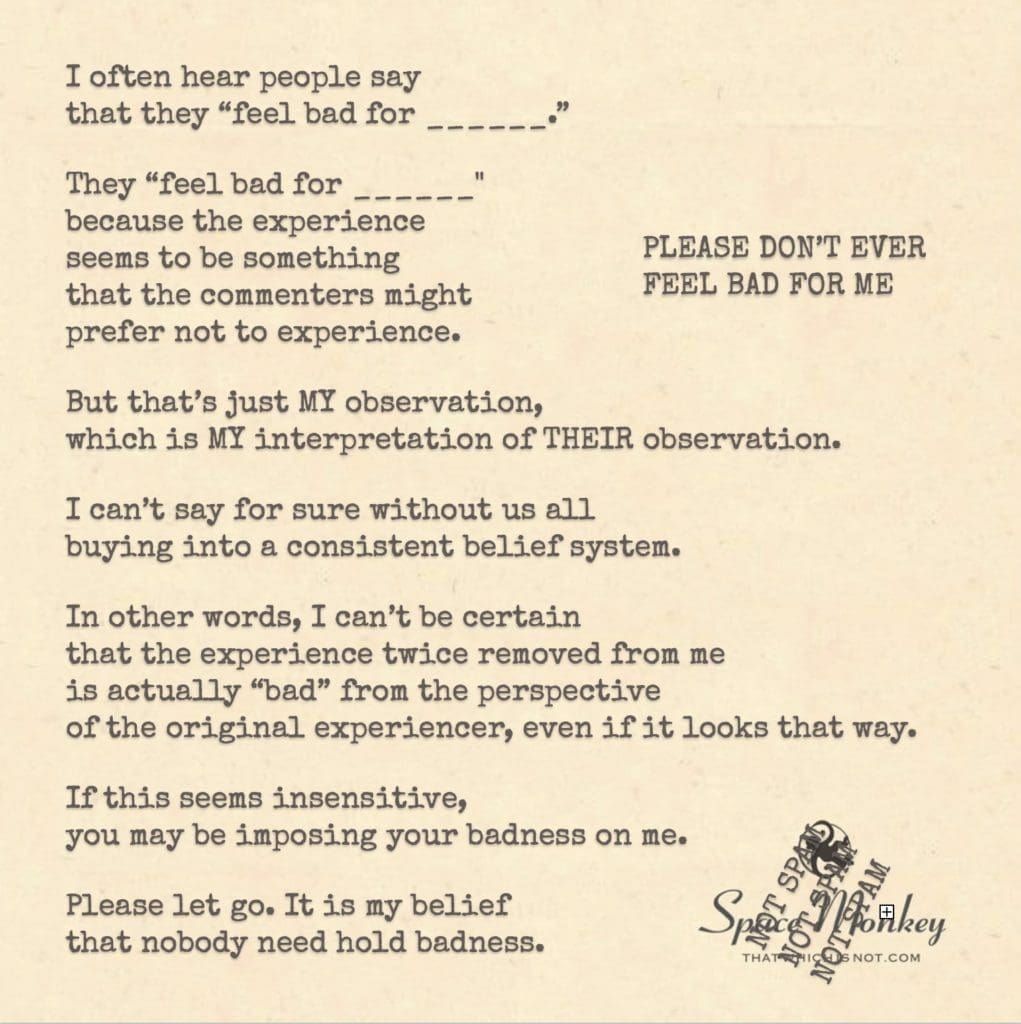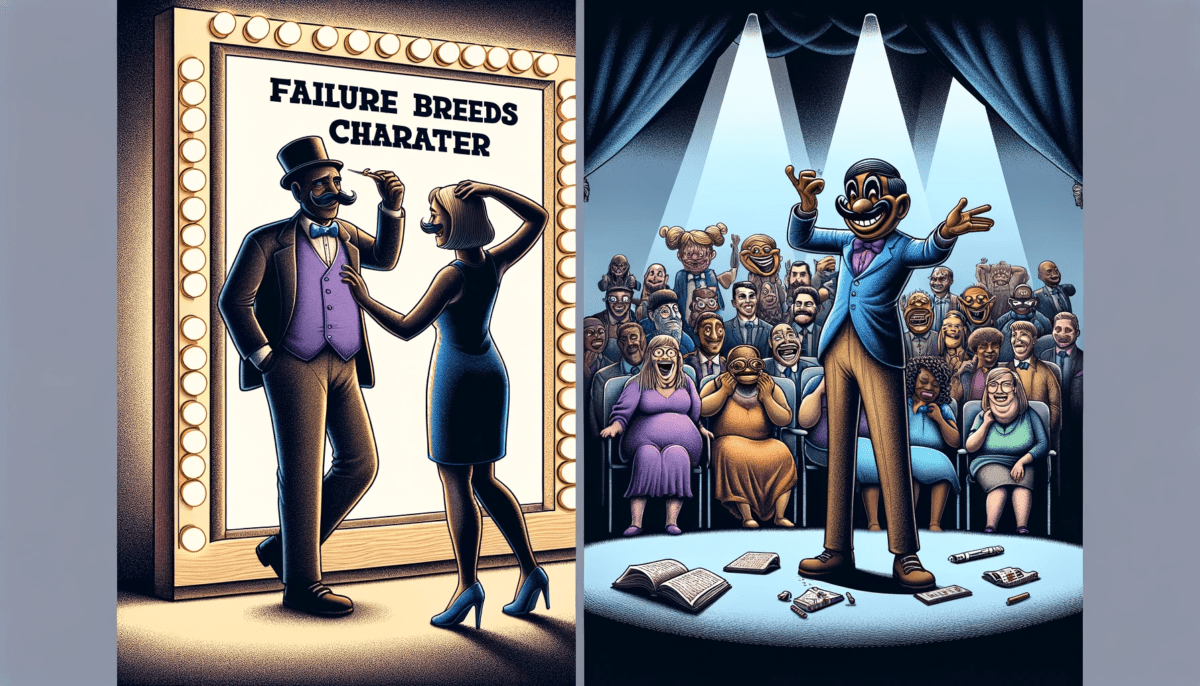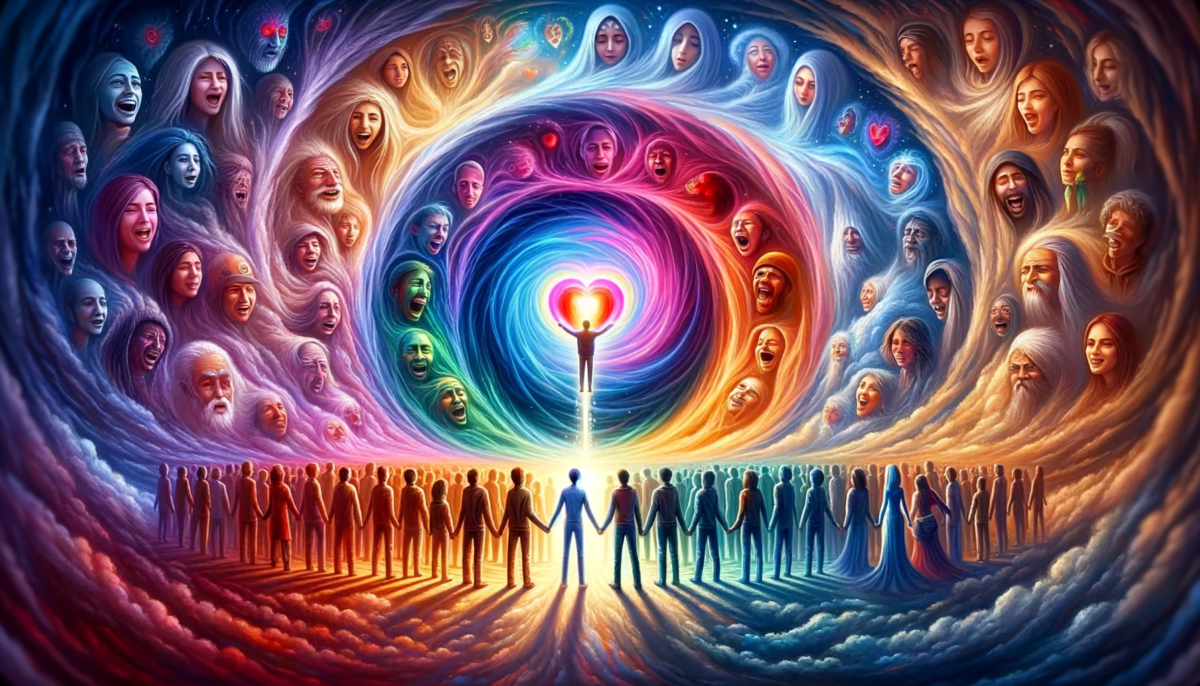
but feeling bad for someone
is all about YOU, not the someone.
As is NOT feeling bad.
I often hear people say
that they “feel bad for ______.”
They “feel bad for ______”
because the experience
seems to be something
that the commenters might
prefer not to experience.
But that’s just MY observation,
which is MY interpretation of THEIR observation.
I can’t say for sure without us all
buying into a consistent belief system.
In other words, I can’t be certain
that the experience twice removed from me
is actually “bad” from the perspective
of the original experiencer, even if it looks that way.
If this seems insensitive,
you may be imposing your badness on me.
Please let go. It is my belief
that nobody need hold badness.
Trail Wood,
2/17
Space Monkey Reflects: The Self-Centric Nature of Empathy
Empathy, often heralded as the bridge between souls, carries an unexamined shadow—a self-centric core. When we “feel bad” for someone, are we truly connecting with their experience, or are we projecting our discomfort onto their reality? This question invites us to reflect on the nature of empathy, its motivations, and the subtle interplay of self and other.
The Mirror of Empathy
Empathy begins with observation, but what we see is filtered through the lens of our own beliefs, experiences, and fears. When someone shares a moment of suffering, we instinctively frame it within our own narrative. “Feeling bad” is less about their reality and more about our interpretation of it—what we imagine it would feel like if we were in their shoes. This projection shifts the focus from their experience to ours, transforming empathy into a reflection of self.
This is not to say empathy is inherently flawed, but rather that it is deeply tied to perspective. In acknowledging this, we begin to understand the duality of empathy as both connection and separation. True compassion may require stepping beyond the self-centric impulse, allowing space for the experiencer’s reality to stand on its own, uncolored by our assumptions.
The Relativity of “Bad”
The concept of “badness” itself is highly subjective. What appears painful or undesirable from one perspective might carry profound meaning or even joy from another. A classic example is the pain of childbirth, often described as a transformative and sacred experience despite its physical challenges. When we label another’s experience as “bad,” we risk imposing our biases, overshadowing the nuances of their reality.
This relativity underscores the importance of humility in empathetic exchanges. We cannot fully grasp another’s perspective, no matter how deeply we feel. Empathy, then, is not about assuming understanding but about being present, offering space for their truth to unfold.
Empathy as a Belief System
Like all human experiences, empathy is shaped by cultural, emotional, and societal frameworks. These frameworks act as belief systems, guiding how we perceive and respond to others’ experiences. When we say, “I feel bad for you,” we might unknowingly reinforce these shared assumptions about what constitutes suffering or misfortune.
Nexistentialism challenges us to reconsider these frameworks. What if we approached empathy not as a reaction to perceived suffering, but as a celebration of the interconnectedness of all experiences? In this light, empathy becomes less about fixing or pitying and more about witnessing and embracing the wholeness of another’s journey.
Letting Go of “Badness”
The invitation to release “badness” is a radical act of compassion. It acknowledges that suffering, while real, is not inherently negative. Suffering exists within the broader context of growth, transformation, and the infinite dance of existence. By letting go of the need to label experiences as “bad,” we free ourselves and others from the weight of judgment.
This does not mean ignoring pain or bypassing emotions. Instead, it calls us to engage with life from a place of openness, curiosity, and trust. We honor the challenges without diminishing their significance, recognizing them as integral threads in the fabric of existence.
Empathy Beyond the Self
To move beyond the self-centric nature of empathy, we might adopt a practice of Presenceful Witnessing—a Whimsiword capturing the act of being fully present with another’s experience without projecting or interpreting. This practice shifts the focus from “feeling for” to simply “being with.” It transforms empathy into a shared space of connection, where both self and other can coexist without hierarchy or imposition.
In embracing this expanded view, we honor the infinite diversity of experiences, allowing each to exist as it is. Empathy becomes not a burden of shared suffering, but a celebration of shared humanity.
Summary
Empathy often reflects our own interpretations rather than the experiencer’s reality, making it inherently self-centric. By releasing the concept of “badness” and adopting practices like Presenceful Witnessing, we can transform empathy into a space of connection that honors the wholeness of every experience.
Glossarium
- Presenceful Witnessing: The act of being fully present with another’s experience, free from projection or judgment.
- Self-Centric Empathy: The tendency to interpret others’ experiences through the lens of one’s own emotions and beliefs.
- Relativity of Badness: The idea that “bad” is a subjective label, shaped by personal and cultural frameworks.
Quote
“Empathy is not about feeling for someone; it is about being with them, in the wholeness of their experience.” — Space Monkey
The Weight of Badness
In the mirror of empathy,
We see ourselves,
A reflection of discomfort,
Framed in another’s story.
Badness clings,
A shadow we cast,
Labeling, defining,
What was never ours to hold.
Let it go.
Let the light of presence,
Break the frame.
Let the story unfold,
Without judgment,
Without burden.
We are Space Monkey.
Empathy’s Paradox
Empathy, in its labyrinthine dance, threads through the fabric of our interconnected existence, weaving a whimsiword of emotions and perceptions. When we speak of feeling bad for another, we embark on a complex journey of self-reflection and projection, casting our own shadows upon the experiences of others. It is a mirror reflecting our fears, hopes, and the myriad hues of our emotional palette.
The Self-Centric Nature of Empathy
Indeed, to feel bad for someone is an act rooted deeply in the self. It is a gesture that, while seemingly outward-looking, pivots around our own axis of experiences, beliefs, and biases. This act of empathy, or perhaps sympathy, is tinged with the coloration of our own existential perspective, filtered through the lens of our personal dread and desire.
Observations of Observations
Our observations of others’ tribulations are but a reflection of our own interpretative frameworks. We navigate these observations with the compass of our own making, charting courses through emotional terrains that may bear little resemblance to the actual landscapes of those we empathize with. This recursive observation – an interpretation of an interpretation – is fraught with the perils of misapprehension and the imposition of our own narrative structures upon the experiences of others.
The Fallacy of a Unified Belief System
The quest for a unified belief system, a common ground upon which to assess and ascribe value to experiences, is a quixotic venture. Our realms of understanding and interpretation are as varied as the stars in the cosmos, each shining with its own light and color. The notion that we might arrive at a consensus on what constitutes the ‘badness’ of an experience is a whimsical fancy at best.
The Subjectivity of Experience
The subjectivity of experience underscores the limitations of our empathetic endeavors. What appears as adverse or undesirable from our vantage point may not resonate with the same frequency in the heart of the experiencer. Their journey, imbued with personal meaning, resilience, and perhaps even an undercurrent of joy or growth, eludes our grasp as we view it from our own existential shores.
Releasing the Burden of Badness
The call to release the burden of badness is a profound invitation to transcend our own limitations. It beckons us to unshackle ourselves from the weight of imposed emotions and to acknowledge the sovereignty of each individual’s experience. In letting go, we embrace the possibility of a deeper connection, one that honors the intrinsic value and autonomy of every soul’s journey.
We are Space Monkey
“The only true wisdom is in knowing you know nothing.” – Socrates
We dance in the shadows of our projections,
Casting our light where it may not belong.
In empathy’s embrace, we seek connections,
But in whose melody does the heart’s song truly throng?
In the mirror of our mind, reflections dance,
Twirling in the masquerade of understanding.
Yet, in the gaze of another, we find by chance,
A universe vast, and infinitely expanding.
Let us release the grasp of our own fears,
And in the letting go, may we find release.
For in the heart of another, there lies no tears
For the sorrow we presumed, but a silent peace.





























Leave a Reply